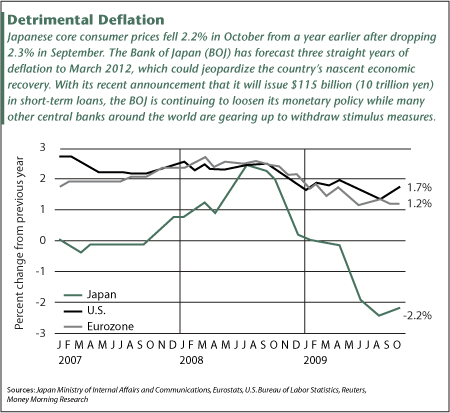The Bank of Japan (BOJ) yesterday (Tuesday) took steps to preserve a fragile economic recovery by pumping more short-term funds into the nation's banking system. However, many analysts are worried that the central bank didn't do enough to put a ceiling on the yen, and prop up its ailing corporate sector.
Japan's central bank said it would make available $115 billion (10 trillion yen) in three-year loans at 0.1% interest. The announcement was made after the BOJ held an extraordinary monetary policy meeting, which was called to "discuss monetary control matters based on recent economic and financial developments," namely the rise of the yen and growing deflation that poses a threat to its nascent economic recovery.
Japan's third-quarter gross domestic product (GDP) rose at a 4.8% annual rate, after revised growth of 2.7% in the second quarter. But the nation's currency, which last week hit a 14-year high against the dollar, is jeopardizing the recovery by making Japanese exports more expensive for other countries.
Latent demand for Japanese goods and a declining dollar have sent Japan's economy into a deflationary spiral. Japan's core consumer price index (CPI) - which excludes fruit, vegetable, and seafood prices but not oil products - fell for an eighth straight month in October, tumbling 2.2%. That followed 2.3% decline in September.
The BOJ expects deflation to last through March 2012, the CPI to decline by 0.8% in the next fiscal year and 0.4% in fiscal 2011.

That's bad news for Japanese exporters. Japan's electronics companies lose a combined $369 million (31.8 billion yen) in annual operating profit for each 1 yen appreciation against the dollar, according to a Daiwa Research Institute Ltd. estimate of 44 companies in September.
Toyota Motor Corp. (NYSE ADR: TM), Sony Corp. (NYSE ADR: SNE), and Canon Inc. (NYSE ADR: CAJ) are some of the better-known companies whose earnings will suffer as the yen gains ground on the dollar.
Japan is "standing on the edge of a cliff" with regards to the yen and that the country needed "urgent steps to counter this critical situation," Canon Chief Executive Officer Fujio Mitarai last month told Bloomberg News.
Canon would lose $50.7 million (4.4 billion yen) in sales and $28.8 million (2.5 billion yen) in operating profit in the three months ending Dec. 31 for every 1 yen gain against the dollar, Mitarai said.
Meanwhile, Toyota's operating loss could widen by $1.0 billion (90 billion yen) in the fiscal second half, forcing the world's largest auto company to move more manufacturing outside the country.
Deflation and Debt a Toxic Cocktail for Japan's Economy
By ramping up short-term borrowing, the BOJ hopes to spark more lending in the corporate sector.
Prime Minister Yukio Hatoyama, who has repeatedly called on the central bank to do more to address Japan's deflation epidemic, lauded the move.
"I applaud their efforts to show their resolve to stop deflation and spur the economy," he told reporters.
But not everyone was comforted by the BOJ's announcement. With a seemingly dire situation for the Japanese economy, many analysts thought the BOJ would be more aggressive.
"What a disappointment," Daisuke Uno, chief strategist at Sumitomo Mitsui Banking Corp. (OTC ADR: SMFJY) in Tokyo, told Bloomberg. "Since they went out of their way to hold an emergency meeting, I thought they would at least boost purchases of long-term government bonds."
Investor disappointment was evidenced by the modest gains the dollar made against the yen following the announcement. The Japanese currency fell to a level of 87.06 per dollar prior to the meeting, but that gain was pared back by yesterday afternoon, when the yen traded at 86.625 per dollar.
The BOJ's reluctance to pursue a policy of full-blown quantitative easing may be explained by its limited options.
With the benchmark overnight lending rate at 0.1% there's little room for the central bank to maneuver. Some analysts believe the BOJ wanted to give itself some leeway if conditions continue to deteriorate.
Matters are further complicated by Japan's overwhelming national debt, which is almost twice the level of its GDP. The Organization for Economic Cooperation and Development predicts Japan's national debt will rise to more than 200% of its gross national product in 2011 from 170% in 2007, already the highest among rich nations.
That makes another government stimulus package extremely unlikely and puts more pressure on the central bank to hold the economy together.
For that reason, it's likely that Japan is headed for another "prolonged period of deflation," despite the central bank's latest moves to ease monetary policy, James McCormack, head of Asia sovereign ratings at Fitch Ratings Inc., told The Wall Street Journal.
"When the economic backdrop is as weak as it is in Japan and deflation is as it has been in Japan, it's very difficult to turn things around quickly," he said. "Our expectation is that it will take a while."
Fitch rates Japan AA with a stable outlook. This rating is supported by the country's huge external assets but is constrained by its weak public finances.
News and Related Story Links:
- Bloomberg News:
Toyota, Sony, Exporters Are on 'Edge of Cliff' on Yen - Bloomberg News:
Global Stocks Rally on BOJ Lending, China Data; Yen Declines - Money Morning:
Investors Can't Ignore a Rebounding Japan - Money Morning:
Japan's Economic Growth Accelerates, but Deficit Raises Concerns - The Wall Street Journal:
Japan Likely In For Another Prolonged Period Of Deflation -Fitch


